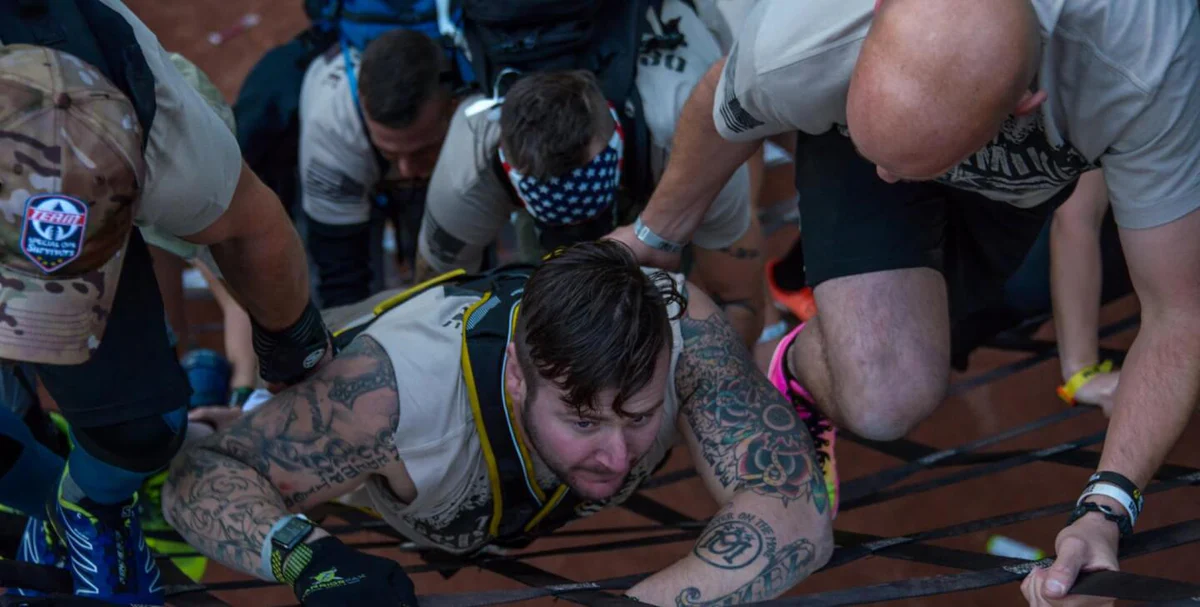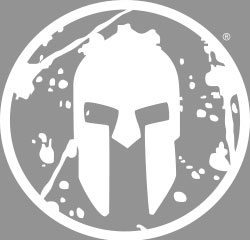Oscar Mike: 'You Don't Have to Do It Alone'

A great rivalry in the world of endurance sports took place in the late 1990s in the Hawaii Ironman. Athletes in wheelchairs had become a common sight in races like the Boston Marathon. But the three years that Carlos Moleda and David Bailey beat the living hell out of each other in over-the-red-line races in Kona helped mark a shift in definition. These were not simply remarkable Challenged-division participants in a hard, harsh endurance event. Rather, Moleda, a Navy SEAL who had been shot and paralyzed in Operation Just Cause in 1989, and Bailey, a motocross star paralyzed in a 1987 preseason accident in Lake Huron, Calif., transcended the division they competed in. They were Ironman triathletes, and two of the best racing in those years. There dedication, discipline and toughness were the thing you noticed. They made the wheelchairs and handcycles seem incidental.
The rivalry began when Bailey set his sights on competing in the Hawaii Ironman and asked a former pro, Todd Jacobs, to train him. Jacobs knew about Moleda and was concerned Bailey didn’t know what he was getting himself into.
“Carlos was a former Navy SEAL, and a complete badass,” Jacobs said. “He was someone who didn’t seek out the cleanest lines, like David did, but who went right through the darkness. He didn’t avoid fear; he went straight for it. I guess a day at Ironman isn’t so bad once you’ve been shot at with machine guns. I said to David. ‘Do you understand who it is you’re messing with here? If you want to beat this guy, you’re going to have to get bloody.’”
In their first encounter at the Hawaii Ironman, Moleda beat Bailey, the favorite, by nearly an hour. In a second hellish battle the following year, Moleda once again thumped Bailey. A painful outcome that inspired Bailey to “get bloody” as Jacobs had advised. In their third pain-fest, Bailey was able to outlast Moleda to finish racing in Kona with a win.
I recalled the Moleda/Bailey rivalry when listening to Noah Currier, Jonathan Lopez and Earl Granville talk about the Oscar Mike Foundation and Operation Enduring Warrior. In the backstory of both Moleda and Bailey, you found two people who had to work through a vast amount of physical, mental and emotional challenge to reestablish their identities as athletes. In the modern parlance, they were quintessential "adaptive athletes." Their initial injuries presented enormous obstacles that would have been easy to back away from. But ultimately they went through them.
Essentially, the mission of both Oscar Mike and Operation Enduring Warrior is to help struggling veterans make the transition to a purposeful, healthy life. The Oscar Mike crew regularly attends Spartan races, executing on their purpose of helping fellow veterans make and sustain the transition to being athletes.
At select U.S. Spartan Races, we'll be offering speciality Oscar Mike charity heats. 100% of the registration fee for these heats goes to the Oscar Mike Foundation and their effort to build a new veteran athletic facility. As an added bonus (and thanks to Orange County Choppers) you’ll also be entered into a giveaway for a custom Spartan chopper, built by TV personality and motorcycle expert, Paul Teutul Sr. And even if you're not quite ready to race (though we highly recommend it), you can still change a veterans life by making a donation to the Oscar Mike Foundation, and you’ll entered into the running to win the one-of-a-kind Spartan chopper. It's time to practice what we preach, Spartans. Let's unite under a shared vision of camaraderie to help those who need us most. No Spartan left behind.
That's the philosophy that Currier, Lopez and Granville, Oscar Mike team members, adhere to. They discuss a number of invaluable ideas in this episode of the Spartan Up podcast, from adopting the right perspective when taking on a problem to having the courage to ask for help when you need it.
When confronted with an obstacle, in life or on a racecourse, rather than go right at an obstacle the “the easiest choice is to go around it,” Currier says on the podcast. The harder but better choice is to find a way to "force yourself to choose to go over it or through it."
Currier, a U.S. Marine, knows the road in an intimate way. Not long after returning from deployment to Iraq in 2003 in the early days of the Iraq War, to Camp Pendleton, he was in an accident and paralyzed. It took Currier six years to work his way out of the deep funk that followed a C-6 spinal cord injury, the light at the proverbial end of the tunnel being exposed to the National Wheelchair Games. “It opened up a whole new world,” Currier told USA Today. “I became more active. There was still a way to get adrenaline and wind in my face even though paralyzed from the neck down.”
Currier began building Oscar Mike, now a foundation and apparel company, with the explicit mission of helping wounded veterans get and stay “On the Move” (the translation of the NATO military alphabet Oscar-Mike acronym).
“All three of us hear have faced some serious obstacles,” Currier says in the podcast. “It almost gives us an unfair advantage when it comes to the next obstacle, because we’ve already overcome so much.”
“Sometimes when adversity falls in our lap we have choices to make,” Earl says. “We can take the easy way out. The pity route I’m a woe-is-me victim route. Or we can try and reach down inside of us and find that grit and move forward.”
A unique quality that Oscar Mike brings to their mission is a profound concept of team.
“You don’t have to do it alone,” Earl says. If you can’t get up an 8-foot-wall, look the team around you. Even strangers. I guarantee they’re going to help you.”
Don’t be afraid to ask for help, he emphasized, suggesting this as advice for anyone seeking to dig themselves out hard spot in their life and go through the obstacle rather than sink back and avoid it. Once you ask for help from the right people, he adds, “you realize you can overcome a lot.”
For more information on any of these organizations, visit Oscar Mike, Orange County Choppers, or Operation Enduring Warrior.











